Next Best Thing to Another Debate?
Questions After Death of Ga. Woman Seeking Abortion
Homepage photo: Democrat Kamala Harris and Republican Donald Trump face off Sept. 10 in their first and most likely the only debate ahead of the Nov. 5 elections (Credit: YouTube)
Support Journal-isms
Democrat Kamala Harris and Republican Donald Trump face off Sept. 10 in their first and most likely the only debate ahead of the Nov. 5 elections (Credit: YouTube)
Next Best Thing to Another Debate?
- Oct. 7 update: CNN’s Brian Stelter reported Oct. 6 for his “Reliable Sources” newsletter: “Univision said Sunday that it is delaying Trump’s town hall event on the network due to the impending hurricane. Rather than taking place on Tuesday in Miami, it has been rescheduled for Wednesday, Oct. 16. Harris’s town hall in Las Vegas is still slated for this Thursday…”
“There may or may not be another debate between Vice President Kamala Harris and former President Donald Trump, but both candidates have agreed to appear in another high-profile TV setting: Town halls to be hosted by the Spanish-language media giant TelevisaUnivision,” Alex Weprin reported Tuesday for The Hollywood Reporter.
“The media company says that both the Trump and Harris campaigns have agreed to the town halls, which will be held next month. The Trump town hall (titled Los Latinos Preguntan … Donald Trump Responde) is set for Tuesday Oct. 8 at 10 p.m., and will be held in Miami, Florida. The Harris town hall (Los Latinos Preguntan … Kamala Harris Responde) will be held Thursday Oct. 10 at 10 p.m. in Las Vegas, Nevada.
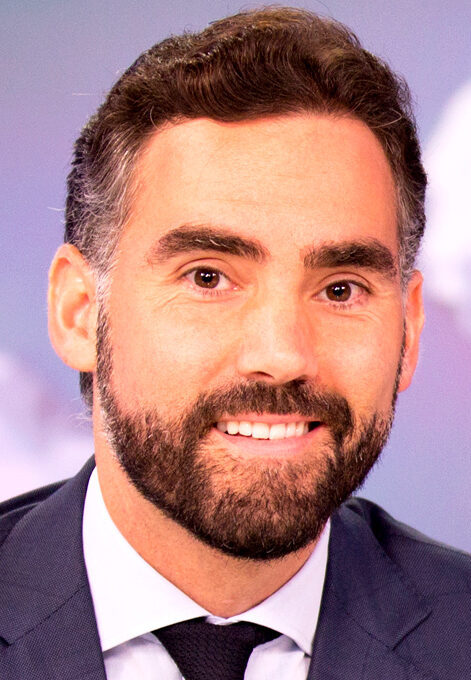 “Televisa En punto anchor Enrique Acevedo (pictured) will serve as moderator for both town halls, with an audience comprised of undecided Hispanic voters.
“Televisa En punto anchor Enrique Acevedo (pictured) will serve as moderator for both town halls, with an audience comprised of undecided Hispanic voters.
“Univision and its streaming service ViX will air the town halls with a Spanish translation, with the full English-language version available on the Noticias Univision YouTube channel.
“ ‘Noticias Univision serves as a two-way bridge: we bring every voice to our community while conveying the concerns of Latinos to those in power,’ said Daniel Coronell, president of Noticias Univision in a statement. ‘There are more than 36 million Hispanics eligible to vote in the U.S., making them the largest minority in the country, with the power to influence the outcome of the race for the White House and the future of the nation,’ he added.
“It is entirely possible that the TelevisaUnivision town halls are the closest thing voters get to an unscripted appearance by the candidates before the election, with another debate very much uncertain. Harris previously accepted a CNN debate, while Trump appeared to reject another debate following the first matchup between the two. . . .”
As Ted Johnson noted for Deadline, “Harris has accepted CNN’s proposal for another debate with Trump, with the event planned for October 23. But Trump has so far declined another, telling an event last weekend that it was too late given that early voting will have started already.”
On Aug, 26, the National Association of Hispanic Journalists issued a statement noting, “The presidential and vice presidential debates of 2024 feature only one journalist of color among six moderators, a failure of leadership that network news still has time to address.”
- Zeeshan Aleem, MSNBC: The Uncommitted Movement’s weird quasi-endorsement of Kamala Harris, explained
- Jon Allsop, Columbia Journalism Review: Yes, Kamala Harris is talking to the press more. Is it enough?
- Perry Bacon Jr., Washington Post: Harris’s caution on racial issues is frustrating but perhaps necessary
- Hayes Brown, MSNBC: The GOP’s Nebraska plan to beat Kamala Harris just hit a wall
- Mary C. Curtis, Roll Call: In battleground North Carolina, a Kamala Harris crowd overflowing with joy — and urgency
- Robert Draper, New York Times: Harris Cracked Down on Violent Offenders; Showed Leniency on Less Serious Crime
- Emil Guillermo, Asian American Legal Defense and Education Fund: Kamala’s gun and the California law that makes her a badass
- Roy S. Johnson, al.com: Birmingham’s blood is on the hands of Alabama Republicans and a silent Trump
- Malika Khurana, Kalina Borkiewicz, Elena Shao, Bora Erden, Ashley Wu and Bedel Saget, New York Times: Trump Claims Harris’s Rallies Are Smaller. We Counted. (Sept. 7)
- Dan Ladden-Hall, Daily Beast: Harris Gives First One-On-One Network Interview as Democratic Nominee to MSNBC’s Stephanie Ruhle (Sept. 25)
- Chris Megerian and Marc Levy, Associated Press: Harris hopes to turn Ukraine war into winning issue in battle with Trump for Polish American votes
- Hanna Panreck, Fox News: Kamala Harris’ interview with Black journalists ‘lacked specifics’: CNN host Abby Phillip
- Stephanie Perry and Curtis Bunn, NBCBLK: Black swing-state voters overwhelmingly back Harris — with key divides on age and gender, Howard poll shows
- Maya Salam, New York Times: Janet Jackson Repeats False Claims About Kamala Harris’s Race
- Michael S. Schmidt, New York Times: As President, Trump Demanded Investigations of Foes. He Often Got Them.
- Kimberly Atkins Stohr, Boston Globe: How the GOP is using courts to try and deny election results
- Will Sutton, NOLA.com: Kamala Harris says ‘I’m Black.’ Black Louisianans have been there before
- Terry Tang and Linley Sanders, Associated Press: Harris is more popular than Trump among AAPI voters, a new APIA Vote/AAPI Data survey finds
- Juan Williams, The Hill: Trump is at 48 percent. How could this be possible but for widespread racism?
Amber Thurman, a 28-year-old mother, died after she couldn’t access a legal abortion in Georgia. The state’s maternal mortality review committee found that her death was preventable. At least two women in Georgia died after they couldn’t access legal abortions and timely medical care in their state, ProPublica found. (Credit: YouTube)
Questions After Death of Ga. Woman Seeking Abortion
“The Georgia hospital that failed to save Amber Thurman may have broken a federal law when doctors there waited 20 hours to perform a procedure criminalized by the state’s abortion ban, according to Sen. Ron Wyden, chair of the Senate Finance Committee,” Ziva Branstetter reported Monday for ProPublica.
“The Emergency Medical Treatment and Labor Act, or EMTALA, requires hospitals to provide emergency care to stabilize patients who need it — or transfer them to a hospital that can. Passed nearly four decades ago, the law applies to any hospital with an emergency department and that accepts Medicare funding, which includes the one Thurman went to, Piedmont Henry in suburban Atlanta. The finance committee has authority over the regulatory agency that enforces the law.
Thurman’s death has become a campaign issue, with Democratic presidential nominee Kamala Harris adding the tragedy to her arguments for restoration of abortion rights, especially in the battleground state of Georgia. Harris is citing it “as a prime example of the dangerous implications of the Supreme Court’s 2022 overturning of Roe v. Wade that ended a constitutional right to an abortion,” as USA Today reported. As president, Trump appointed the justices that provided the decisive majority to overturn Roe.
ProPublica continued, “In a letter sent Monday, Wyden, an Oregon Democrat, cites ProPublica’s investigation into Thurman’s death, which was found preventable by a state committee of maternal health experts. The senator’s letter asks Piedmont CEO David Kent whether the hospital has delayed or denied emergency care to pregnant patients since Georgia’s abortion ban went into effect. (Kent did not respond to requests for comment.)
“ ‘It is my duty to conduct oversight of potential violations of patients’ rights under these laws,’ Wyden wrote. The senator asked for the hospital’s policies covering treatment of patients with emergencies that require abortion care. He also asked for a list of personnel involved in making those decisions. He gave the hospital a deadline of Oct. 24 to provide those and other requested records and answers.
“Wyden sent the same letter citing ProPublica’s reporting on Thurman to seven hospitals in North Carolina, Florida, Missouri, Louisiana and Texas. One letter seeks information from a Texas hospital where Yeniifer Alvarez-Estrada Glick died in 2022 from complications of pregnancy including hypertension, as reported by The New Yorker. Other letters seek information from hospitals where women have reportedly been turned away or experienced delayed care. . . .”
- Kayla Bartsch, National Review: Untreated Side Effects of Abortion Drug Killed Amber Thurman, Not Georgia’s LIFE Act
- Giovanna Dell’Orto, Amelia Thomson-Deveaux, Luis Andrw Henao and David Crary, Associated Press: Most Hispanic Americans support abortion access: AP-NORC poll
- PolitiFact: Kamala Harris is right: Black women in the US have the highest maternal mortality rate (July 13)
- Margo Snipe, Capital B: The Maternal Mortality Rate Dipped For Black Women. The Reason Is Complicated. (May 2)
Beaten in Cuba, Now Abused by the U.S.
Sept. 22, 2024, updated Sept. 23
Journalist Among Migrants Held at Guantanamo
CNN Reporters Upend N.C. Governor’s Race
Haitian Times Grapples With New Level of Vitriol
Anti-DEI Efforts Gain; House OKs ‘Anti-Woke’ Bill
Cuba Cracks Down on Smugglers of U.S. News
8 Imprisoned Journalists Tell Writers Their Stories
Passings:
With James Earl Jones, I Discovered the Most Amazing Thing
Frankie Beverly, Music for Cookouts, and More
Tina McElroy Ansa, Novelist but Also Newspaper Pioneer
Short Takes: LaSharah S. Bunting; Baltimore Sun firing; Gayle King; Johnny Green Jr.; Online News Association awards; end of intenet program for the needy; ‘literacy crisis’ for Black students; Susan Smith Richardson; Indigenous Journalists Association; $15 million for local news in L.A.; Alfredo Corchado; delivering news by AI in Venezuela.
Support Journal-ismsIn this Spanish-language video from 2022, independent Cuban journalist Alberto Corzo discusses the beating he received and his subsequent hospital stay, “where the assistance I received was poor. . . . I also want to take the opportunity to thank all the international organizations that have spoken out in my favor,” he said. (Credit: YouTube)
Journalist Among Migrants Held at Guantanamo
An independent Cuban journalist who fled to Guantanamo Bay with his family after being beaten, purportedly on orders of Cuban security agents, is at the center of a new report charging that the United States is mistreating Cuban and Haitian migrants at the base.
“I left Cuba hoping to find freedom,’ said Alberto Corzo, who fled his country with his wife, three sons and a handful of others who managed to squeeze into the small wooden boat that he spent a month building as he planned his escape,” Hamed Aleaziz reported Thursday for The New York Times.
 “After the Coast Guard stopped them and delivered them to Guantánamo, Mr. Corzo (pictured in 2022) said he and his family saw their dreams of America dwindle. ‘We felt like prisoners of the United States,’ he said, ‘with certain privileges.’ “
“After the Coast Guard stopped them and delivered them to Guantánamo, Mr. Corzo (pictured in 2022) said he and his family saw their dreams of America dwindle. ‘We felt like prisoners of the United States,’ he said, ‘with certain privileges.’ “
The Times said it based its report on internal government reports it obtained, along with interviews with migrants and advocacy groups. It coincided with a report last week from the New York-based International Refugee Assistance Project (IRAP), a global legal aid and advocacy organization.
That project said, “For decades, the United States has detained refugees encountered at sea at Guantánamo Bay in a little-known facility called the Guantánamo Migrant Operations Center (the ‘GMOC’). The Biden administration reportedly has considered using the facility for the mass detention of immigrants fleeing rapidly deteriorating security conditions in Haiti. The GMOC is distinct from the notorious military prison on the base, but both are used by the United States government to shield its actions from public scrutiny and accountability.”
“They make you feel as though to migrate is a crime,” Corzo, held with his family at Guantánamo for months, said in the report.
“Refugees held at the GMOC provided IRAP with firsthand accounts of inhumane conditions, mistreatment, and a complete lack of accountability at the offshore detention site, where the U.S. refuses to apply domestic standards related to immigration and detention. Conditions include undrinkable water and exposure to open sewage, inadequate schooling and medical care for children, and collective punishment of detained Cuban and Haitian refugees. . . .”
The organization called for the United States to shut down the GMOC and discontinue its use as long-term detention center for refugees.

A Coast Guard boat near Guantánamo Bay. Migrants who are picked up at sea and pass their initial asylum screenings are given a choice: Go home or go to Guantánamo and try to find a third country to take them in. (Credit: Doug Mills/New York Times)
The Times said, “The number of people held at Guantánamo is only a fraction of those who try to cross the southern border. Just 37 migrants were held there from 2020 to 2023; in the past decade, the number of families has been in the single digits. As of February, the facility was holding four migrants, according to the Department of Homeland Security.
“Those numbers include only the people who passed their asylum screenings and were allowed to petition for resettlement in a third country. It is not clear how many people have been held there who were quickly deported back to their home countries.”
Syra Ortiz Blanes reported Saturday for the Miami Herald, “A spokesperson from the Department of State, which oversees the processing and care of migrants held there with the Department of Homeland Security and the International Organization for Migration, denied the report’s findings to the Miami Herald.
“The claim that migrants housed at the Migrant Operations Center (MOC) are ‘detainees’ and they lived there in ‘prison-like conditions and had their rights violated’ are false,” said the spokesperson.
“The spokesperson said the facility’s operations were consistent with the Department of Homeland Security’s housing policies, and that migrants received food and healthcare and had access to learning and recreational activities as well as laundry, gym and kitchen facilities. They also said that protected migrants could go to work, shop for groceries at the base’s store and attend social and religious activities.
“The spokesperson emphasized that the facility is humanitarian in nature and that people can return to their country of origin at any time, while eligible migrants can wait to be resettled.” But Jose Miranda, a senior staff attorney at the organization who represented a Cuban family featured in the report, said that the migrants were presented with a “false choice.” “People are faced with the choice to wait indefinitely to be resettled somewhere they will be safe or return somewhere where they face persecution,” he told the Herald.
In 2022, Corzo, executive director of the Cuban Institute for Freedom of Expression and Press, “was brutally attacked by two unknown persons sent by the political police,” the institute said then, “suddenly attacked by two individuals specialized in martial arts who left him lying on the road without stealing any of his belongings.
“The journalist couple Alberto Corzo and Martha Liset Sánchez are systematically victims of different types of aggression by the Cuban regime,” the organization said.
“In 2021, Corzo was attacked 33 times, while his wife was the victim of repression and harassment by the Cuban dictatorship on about 25 occasions . Arbitrary detention was the aggression that journalists endured the most.
“The 10-year-old children of Corzo and Sánchez are also victims of the Cuban regime for the simple fact that their parents are independent journalists.”
More on Cuba later in the column.
- David C. Adams, Columbia Journalism Review: The crackdown on Cuba’s independent press (Sept. 13)
- Graham Lee Brewer and Terry Tang, Associated Press: AP Explains: Migration is more complex than politics show
- RFK Human Rights: Inside the Black Hole: Systemic Human Rights Abuses Against Immigrants Detained & Disappeared in Louisiana (August 2024)
I wanted to take a minute to address the latest outrageous lies coming from my opponent’s dishonest campaign: #ncgov #ncpol pic.twitter.com/RtteVUiozr
— Mark Robinson (@markrobinsonNC) September 19, 2024
CNN Reporters Upend N.C. Governor’s Race
The work of two CNN reporters uncovering damaging comments on a porn site by North Carolina GOP gubernatorial candidate Mark Robinson has upended the state’s race for governor, led to the Raleigh News & Observer calling for Robinson to get out of the contest, inspired Democrats to gleefully spread word of the scandal and threatens presidential candidate Donald Trump’s hopes to carry the battleground state.
CNN reported Sunday that several top operatives on Robinson’s campaign had stepped down.
Andrew Kaczynski and Em Steck report for CNN’s KFile, a political unit that migrated to CNN in 2016 from BuzzFeed.
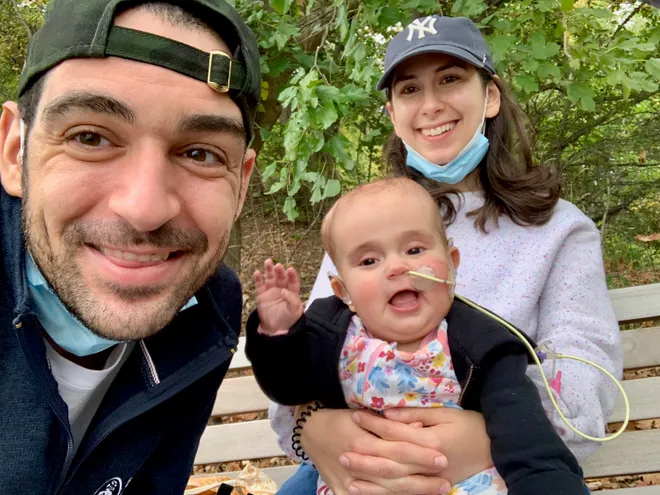 Last month, Kaczynski and his wife, fellow journalist Rachel Ensign, were honored by the Boston Red Sox for their fund-raising efforts for cancer research after losing their infant daughter to a brain tumor. Kaczynski also runs in the Boston Marathon. (Courtesy photo shows Kaczynski, Ensign and their infant daughter, who died in 2020.)
Last month, Kaczynski and his wife, fellow journalist Rachel Ensign, were honored by the Boston Red Sox for their fund-raising efforts for cancer research after losing their infant daughter to a brain tumor. Kaczynski also runs in the Boston Marathon. (Courtesy photo shows Kaczynski, Ensign and their infant daughter, who died in 2020.)
“Mark Robinson, the controversial and socially conservative Republican nominee for governor of North Carolina, made a series of inflammatory comments on a pornography website’s message board more than a decade ago, in which he referred to himself as a ‘black NAZI!’ and expressed support for reinstating slavery, a CNN KFile investigation found,” Kaczynski and Steck reported Thursday.
“Despite a recent history of anti-transgender rhetoric, Robinson said he enjoyed watching transgender pornography, a review of archived messages found in which he also referred to himself as a ‘perv.’
“The comments, which Robinson denies making, predate his entry into politics and current stint as North Carolina’s lieutenant governor. They were made under a username that CNN was able to identify as Robinson by matching a litany of biographical details and a shared email address between the two. . . .”
On Friday, Hannah Knowles and Amy Gardner of The Washington Post reported that a user of the porn site Nude Africa who is linked to Robinson praised Adolf Hitler’s book “Mein Kampf” in addition to declaring himself a “black NAZI,” according to screenshots the Post obtained.
Vice President Kamala Harris’ Democratic presidential campaign posted a mocking video Thursday that featured pictures of Trump and Robinson together, Knowles, Cleve R. Wootson Jr. and Amy Gardner reported Friday for the Post. “The video included clips of Trump praising Robinson, saying he is ‘like Martin Luther King on steroids’ in one clip. In another, he compares Robinson to ‘a fine wine.’ ”
However, Robinson also reportedly called King a “commie bastard” in 2011 and allegedly wrote, “I’m not in the KKK. They don’t let blacks join. If I was in the KKK I would have called him Martin Lucifer Koon!,” the Daily Beast reported.
- Jennifer Bendery, HuffPost: Oops! Mark Robinson Decries ‘Lies’ About Porn Site Posts, Then Says They ‘Possibly Happened’
- Curtis Bunn, NBC BLK: Black pastors rebuke Mark Robinson’s reported remarks about Martin Luther King Jr.
- Stephen Collinson, CNN: Why a scandal consuming a Trump protégé could harm the ex-president in North Carolina
- Editorial, Raleigh (N.C.) News and Observer: Mark Robinson should quit the race for NC governor. If not, the GOP should shun him
- Dominick Mastrangelo, The Hill: Robinson threatens CNN with legal action over report: ‘We’re going after them’
- Q City Metro, Charlotte, N.C.: Black advocates demand Mark Robinson withdraw from governor race, says his rhetoric is ‘rooted in hate’
- Mary Ramsey, Charlotte Observer: NC Democrats look to tie GOP to Mark Robinson’s racist, graphic comments in CNN story
- Eugene Robinson, Washington Post: The GOP can’t resist the allure of a Trump-friendly Black conservative
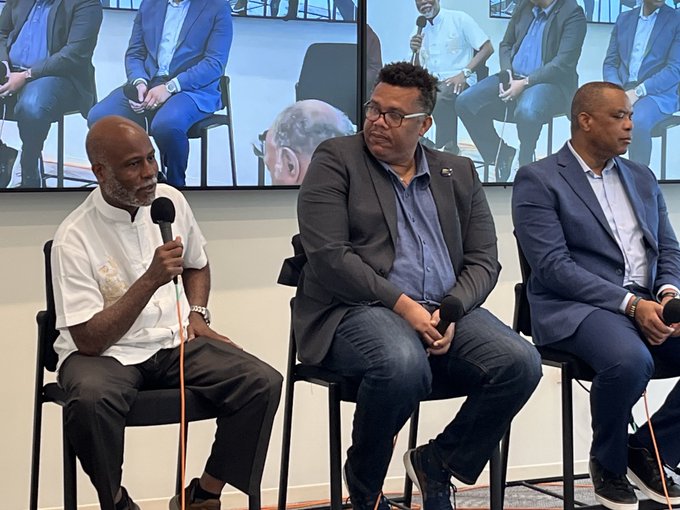
Garry Pierre-Pierre, left, at Aug. 1 Journal-isms Roundtable on “Press Freedom in Black-Run Countries,” with exiled Haitian journalist Roberson Alphonse, center, and John Yearwood of Politico. Of the threats to the Haitian Times, Pierre-Pierre told The New York Times, “This is new territory for us. We fled fascism in Haiti and now in the United States we’re facing some of the tactics that we fled from.” (Credit: Deborah Barfield Berry)
Haitian Times Grapples With New Level of Vitriol
“During a journalism career that has spanned nearly 40 years, Garry Pierre-Pierre has faced threats, intimidation and open racism by readers of his work,” Benjamin Mullin reported Thursday for The New York Times.
“But the vitriol has reached another level over the past week as The Haitian Times, a publication he founded, has chronicled the unfounded claims that Haitian residents of Springfield, Ohio, have been eating their neighbors’ pets.
“In recent days, a surge of remarks posted on the outlet’s site containing racial epithets led Mr. Pierre-Pierre to shut down the comment section. The publication’s special projects editor, Macollvie Neel, was ‘swatted’ — police officers were sent to her residence under the false pretense, cooked up by a prankster with her address, that someone had been murdered there for making racist remarks. And a woman interviewed by The Haitian Times received threats after her quotes were published in an article, leading her to request that her name be removed.
“ ‘I’ve covered crazy stuff,’ Mr. Pierre-Pierre said. ‘I’ve never experienced anything like that.’
“False claims about Haitians in Springfield have ricocheted across social media over the past two weeks — illustrated by memes depicting conservative figures alongside cats and dogs — particularly after former President Donald J. Trump referenced the falsehoods during the presidential debate last week. . . .”
In a statement Friday, the National Association of Black Journalists said “The spread of such disinformation and the subsequent attacks reflect a willful, malicious, and reckless disregard for human life.
“We call on not only local authorities but also political parties and social media platforms to take action against the intentional spread of disinformation “that is leading to these senseless attacks.
“We call on news leaders to protect their journalists and provide training, just as the Haitian Times did in partnering with the Committee to Protect Journalists. . . . “
- Jeremy Barr, Washington Post: How the Haitian Times is covering dangerous rumors in Ohio
- Charles M. Blow, New York Times: Trump’s Bogus Claims About Haitians Are Part of a Bigger Agenda
- Jamelle Bouie, New York Times: Trump Knows What He’s Doing in Springfield. So Does Vance.
- Editor & Pubisher: Inside the newsroom of the Springfield (OH) News-Sun: Battling misinformation on the frontlines of local journalism
- Ryan Grim, Substack: The Haiti news cycle might be our stupidest and meanest yet
- Haitian Times: Springfield, Ohio locals navigate their community despite the spread of false information about the Haïtian community (video)
- Jake Johnston, Drop Site News: The Outsourcing of Haiti: How U.S. Intervention Laid the Groundwork for the Crisis of Today (Sept. 15)
- Glenn Kessler, Washington Post: Day by day, how JD Vance tweeted misinformation about Springfield
- Kris Maher, Valerie Bauerlein and Tawnell D. Hobbs, Wall Street Journal: How the Trump Campaign Ran With Rumors About Pet-Eating Migrants—After Being Told They Weren’t True
- Lauren Penington, Denver Post: Donald Trump says he’ll visit Aurora. The mayor hopes to dispel claims the city is “being overrun” by a Venezuelan gang.
- Dave Perry, Sentinel Colorado: Open letter to Trump — Aurora embraces diversity, so there’s nothing here for you
- Lydia Polgreen, New York Times: Trump Has Crossed a Truly Unacceptable Line (Sept. 14)
- Eugene Robinson, Washington Post: In Springfield, I heard stories about strain, promise — and race
- Michael Rubinkam and Julie Carr Smyth, Associated Press: What to know about the threats in Springfield, Ohio, after false claims about Haitian immigrants
- Nell Salzman and Laura Rodríguez Presa, Chicago Tribune: In Chicago, a resilient and strong Haitian community celebrates its contributions to the city
- Elliot Spagat, Associated Press: Trump’s goal of mass deportations fell short. But he has new plans for a second term

“The historic Run Richmond 16:19 race was held on Saturday morning, bringing thousands of people out [to] Kanawha Plaza to run, jog or walk the former slave trails of the River City,” Jennifer Blake reported Saturday for WWBT-TV in Richmond, Va. “This race gives people a chance to get up, get active, and ensure that the African American history of Richmond doesn’t fade while connecting the community. ‘We’re really just trying to champion this idea of unity in diversity in [hopes] that we can all live together,’ said the event creator and famous actor, Djimon Hounsu.” (Credit: WWBT)
Anti-DEI Efforts Gain; House OKs ‘Anti-Woke’ Bill
A GOP measure barring accrediting organizations from requiring colleges and universities to adopt diversity, equity and inclusion policies as a condition of accreditation passed the U.S. House on Thursday, the latest from an anti-DEI movement that has resulted in drops in diversity on college campuses and curtailment of such programs by American corporations.
The Republican bill is not expected to pass the Democrat-controlled Senate, Shauneen Miranda reported for the Kansas Reflector and States Newsroom, but the drops in campus diversity have the potential to constrict the pipeline for diverse future journalists and, as the National Association of Black Journalists has been warned, corporate funding of journalism organizations.
The anti-DEI effort now extends to LGBTQ+ people. Ford “confirmed it’s the latest company to withdraw from the Human Rights Campaign’s Corporate Equality Index amid pressure from a right-wing activist,” Axios reported in late August. Ford joins Harley- Davidson and Lowe’s.
“When Lowe’s announced its departure from the index, the company said it was combining resource groups into one umbrella organization. It also planned to stop sponsoring and participating in some festivals and parades to ensure that company policies are lawful and aligned with its commitment to include everyone,” Cathy Bussewitz reported Tuesday for the Associated Press.
The journalism associations have not taken any significant legal action to protect progress they have made on diversity, although Gannett Co. and CBS are now in court over claims that white men are being discriminated against.
However, on Friday, the advocacy organization Free Press reported that “public-interest, media-reform, media-justice and labor organizations joined to file an amicus curiae brief defending the Federal Communications Commission’s broadcast-ownership rules against an industry challenge in the Eighth Circuit Court of Appeals.
“The six groups are Common Cause, the Communications Workers of America-National Association of Broadcast Employees and Technicians, Free Press, the Future of Music Coalition, the musicFIRST Coalition and the United Church of Christ Office of Communication, Inc. (‘UCC Media Justice’). All of these entities have long participated in FCC proceedings and court cases on this issue. Attorneys Cheryl Leanza and Rachel Stillwell authored and filed the brief on the groups’ behalf.
“The FCC’s media-ownership rules are designed to promote competition, viewpoint diversity, ownership diversity and the delivery of local content by broadcast stations licensed to serve communities all across the United States. A series of deregulatory decisions the agency has made over the last two decades has significantly pared back these rules. The FCC undergoes a congressionally mandated review of these regulations every four years,” the Free Press statement said.
 After the Ford decision curbing LGBTQ+ outreach, Ken Miguel (pictured), national board director of NLGJA: The Association of LGBTQ+ Journalists told Journal-isms:
After the Ford decision curbing LGBTQ+ outreach, Ken Miguel (pictured), national board director of NLGJA: The Association of LGBTQ+ Journalists told Journal-isms:
“Organizations, particularly media companies, are stronger when their workforce is diverse and representative, and when their employees feel supported and seen in all of their identities. Companies turning away from DEI commitments are turning away from their own employees, and from building a more diverse workforce that is representative of our country as a whole. It has been disappointing to see these organizations cave to pressure from bad actors on the far-right, abandoning both their own people and a path to greater progress.”
While the House passed its “anti-woke” bill last week, the Congressional Black Caucus this month issued a “new corporate accountability report, ‘What Good Looks Like’: A Corporate Accountability Report on Diversity, Equity, and Inclusion – a first-of-its-kind report to hold Fortune 500 companies — across all sectors — accountable to their diversity, equity, and inclusion commitments and racial equity investments post-George Floyd.“
The caucus said, “The report further outlines 12 Best Practices and innovative approaches (or ‘What Good Looks Like’), taken by companies across various industries to promote diversity, equity, and inclusion in their workplaces and beyond, which the CBC hopes corporations will use as a standardized tool to strengthen, magnify, and expand diversity, equity, and inclusion practices across industries. . . .”
- Chelsea Bailey, CNN: What college campuses look like after the end of affirmative action (Sept. 14)
- Geoff Bennett and Courtney Norris with Simone Foxman of Bloomberg News, “PBS News Hour”: How some companies are scaling back DEI initiatives after conservative backlash (Aug. 27)
- Nathan Bomey, Axios: Anti-DEI movement gaining steam as Ford exits LGBTQ+ index (Aug. 28)
- Matt Brown, Associated Press: Black Caucus issues new guidelines for DEI policies and urges firms to help reduce racial wealth gap (Sept. 9)
- Izzy Bryars, Boston Globe: BU’s Black first-year student enrollment falls to 3 percent, Northeastern to 5 percent (Sept. 12)
- Cathy Bussewitz, Associated Press: Major companies abandon an LGBTQ+ rights report card after facing anti-diversity backlash
- Alexandra Chaidez and Char Adams, NBC News: Black enrollment dips at some top colleges after Supreme Court affirmative action ruling (Sept. 4, updated Sept. 5)
- Madiba K. Dennie, Ballsandsstrikes.org: The Conservative Legal Movement Doesn’t Want Black Women to Stand a Chance (Sept. 13)
- Thomas Gebremedhin, LitHub: Between the Lines: What Is Missing in the Diversity in Publishing Discourse
- Molly Gibbs, Bay Area News Group: California lawmakers send bill banning college legacy admissions to governor (Sept. 3, updated Sept. 4)
- Max Goldbart, Deadline: BBC Increases Representation Target On All Shows To 25% After Revealing $318M Diversity Content Spend (Sept. 4)
- LZ Granderson, Los Angeles Times: Finally, a reckoning on how we teach American history
- Cydney Grannan, Benjamin Toff and Kathleen Searles, Poynter Institute: How newsrooms track the diversity of their sources can lead to tradeoffs in time spent, information collected (Aug. 29)
- Indiana University Northwest: IU Northwest celebrates cultural and intellectual diversity at the 20th anniversary of the Diversity Landmark Wall of Fame
- Johnny Jackson, Diverse: Issues in Higher Education: Report Identifies Decline in Black Male HBCU Enrollment (Aug. 26)
- Johns Hopkins University: Johns Hopkins sees shifts in demographic makeup of incoming class in wake of 2023 SCOTUS ruling
- Roy S. Johnson, al.com: Anti-DEI law is ‘straight, white only’ sign at Alabama’s schoolhouse doors (Sept. 3)
- Jim Jump, Inside Higher Ed: Making Sense of MIT’s Diversity Decline (Sept. 3)
- Katherine Knott, Inside Higher Ed: Amherst and Tufts Report Drop in Students of Color (Sept. 3)
- Hannah Knowles, Washington Post: Trump’s second-term agenda on LGBTQ issues alarms civil rights groups
- Liam Knox, Inside Higher Ed: Ed Blum Puts Colleges ‘On Notice’ Over Diversity
- Liam Knox, Inside Higher Ed: An Early Look at Diversity Post–Affirmative Action (Sept. 6)
- Meredith Kolodner and Joanna Hou, Hechinger Report/Washington Post: Cuts to race-based scholarships block path to college, students say (Aug. 28)
- Melissa Korn, Wall Street Journal: The Colleges Falling Behind on Black Student Enrollment (Sept. 9)
- Jean Marbella, Baltimore Sun: They served in an increasingly diverse military. Now they’re watching Naval Academy’s race-conscious admissions policy go on trial
- Shauneen Miranda, Kansas Reflector: U.S. House passes ‘anti-woke’ bill aimed at diversity, equity and inclusion in higher ed
- Annie Ma and Makiya Seminera, Associated Press: Freshman classes provide glimpse of affirmative action ruling’s impact on colleges
- Jean Marbella, Baltimore Sun: Affirmative action lawsuit: U.S. Naval Academy says race-based admissions necessary (Sept. 16)
- Kevin Marek, Philanthropy Women: The Fearless Fund Has Been Taken Down. Who’s Next? (Sept. 12)
- Julian Mark and Taylor Telford, Washington Post: Fearless Fund settles with DEI foes, ends grant program for Black women (Sept. 11)
- Danny McDonald and Helena Getahun-Hawkins, Boston Globe: Fewer students of color at some Mass. colleges after Supreme Court ruling (Aug. 30)
- NY Carib News: Education – Black Men Enrollment at HBCUs Continues to Decline (Sept. 11)
- Analisa Novak, CBS News: Fearless Fund CEO Arian Simone on why she sees legal settlement as a win and what’s next (Sept. 13)
- David Plazas, Tennessean, Nashville: Tractor Supply caved to anti-DEI pressure. Their promises were too good to be true. (July 2)
- Safiyah Riddle, Associated Press: Alabama anti-DEI law shuts Black Student Union office, queer resource center at flagship university (Aug. 30)
- MKakiya Seminera, Associated Press: After diversity pushback, some faculty feel left in dark at North Carolina’s flagship university (Aug. 30)
- Emily Sisk, The Northerner, Northern Kentucky University: NKU agreed to pay $150k to former chief diversity officer in exchange for departure
- Will Sutton, NOLA.com: HBCUs are the best option for most Black students, but Black male enrollment lags
- Kimmy Yam and Alexandra Chaidez, NBC News: Asian Americans see mixed results in enrollment after end of affirmative action (Sept. 12)
In Spanish, Telemundo 51 reports in July that Cuban economist and demographer Juan Carlos Albizu-Campos warns that statistics about his country show a system progressively approaching “implosion.” (Credit: YouTube)
Cuba Cracks Down on Smugglers of U.S. News
By Julio Antonio Rojas
The Cuban government is banning the importation of devices that permit Cubans to view Spanish-language news programs from the United States, following measures that cut off internet access to certain disfavored Cubans, including some independent journalists, and a new requirement that female high school journalism graduates must perform military service, where they are indoctrinated with government viewpoints.
The latter requirement is in line with the views of the father of the Cuban revolution, the late president Fidel Castro, who said, “I believe that the press (…) has the primary mission of defending the Revolution. To defend the Revolution is to defend socialism. When we speak of this Revolution, I cannot conceive of it as being separate from socialism; they are inseparable.”
The latest list of banned activities, which were to take effect Sept. 19, includes the prohibition of creating “news agencies and other information service activities such as telephone information, searching for information in exchange for payment and selection of news, press clippings and others.”
“The weekly package has been a lifeline for those seeking to avoid state television at all costs,” as CubaNet reported.
The U.S. news programs on Miami’s Telemundo 51 and Univision 23 are part of what is known as “the package.”
In some Miami stores, “the package” is sold in flash memory and removable hard drives, with prices varying depending on the amount of purchased gigabytes.
The purchasers travel as “mules” to the United States, Panama and Mexico, among other countries, to bring packages to Cubans who order them and pay the mules’ travel expenses.
Meanwhile, the Cuban Institute for Freedom of Expression and Press reports that during August, 10 journalists were among those whose internet access was curtailed, along with 12 activists. The action was taken in connection with the 30th anniversary of Maleconazo, a protest on Aug. 5, 1994, in which thousands of Cubans took to the streets in Havana to demand freedom and express frustration with the government.
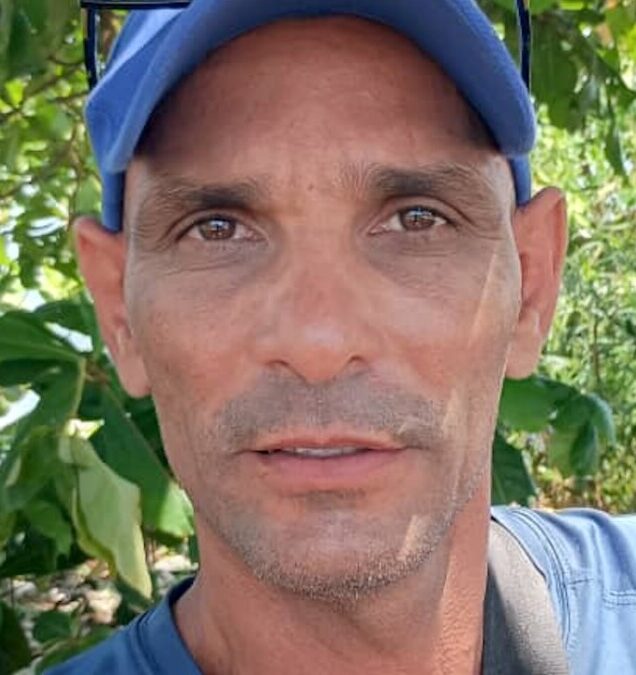 One of those affected was independent journalist Carlos Michael Morales (pictured), who during August received three threats, two from the judicial system and one from the political police.
One of those affected was independent journalist Carlos Michael Morales (pictured), who during August received three threats, two from the judicial system and one from the political police.
While serving a sentence of eight months of house arrest for participating in protests in 2021, the authorities intended to force him to work with the State and if he maintains his refusal they threaten him with imprisonment.
State Security even offered him exile if he obtained a visa to leave the country.
In another development, “At the end of January, the news broke that young Cuban women who choose to study for a Bachelor’s degree in Journalism must complete a year of Mandatory Military Service beforehand,” CiberCuba reported Aug. 27. “The measure will come into effect starting the 2024-2025 academic year.
“So far, military service is mandatory in Cuba for males, who are called up from the age of 16. However, the regime insists on denying its obligatory nature, despite the fact that the National Defense Law establishes in Chapter VIII, Section Three (Article 77), that ‘male citizens, during the year they turn sixteen years old, are obliged to formalize their registration in the military registry.’ “
The regulations also establish that “once registered in the military registry, citizens are obliged to comply with activities aimed at preparing them for incorporation into the Military Service and to keep their status duly updated.”
According to the report from the official media, ‘these young people decide to make a revolution through journalism” and for this reason “they fulfill the requirement of active military service, something new for the girls, whom they see as a positive thing.’
” ‘I believe that fulfilling this great honor of preparing ourselves to defend the homeland, which is fulfilling active military service, will contribute greatly to our future formation as journalists of our country since we will acquire a responsibility and a discipline that will truly be useful for our career and for doing the journalism that our country and our revolution currently need,’ said Ana Laura Campello Pérez.”
Julio Antonio Rojas reports from Havana.
- CiberCuba: US donations to Cuba increase: Highest figure in 10 years (Sept. 10)
- CiberCuba: New Citizenship Law in Cuba: Without a homeland, but without a master (June 25)
- Orlando Matos and Carmen Sesin, NBC News: Cuba’s entrepreneurs fear new regulations on private sector may force them to shut down (Sept. 4)
- Nick Miroff, Washington Post: Biden administration restarts migrant program, boosting fraud checks (Aug. 29)
- Patricia Quintana, CubaNet: A hundred Cuban repressors have emigrated to the US, organizations warn (Aug. 27)
8 Imprisoned Journalists Tell Writers Their Stories
“An estimated 581 journalists are currently imprisoned around the world for the crime of simply doing their jobs,” Reporters Without Borders wrote Sept. 12.
“They are unjustly behind bars for exposing corruption, calling out injustices, and holding states and regimes to account. NGO RSF (Reporters Without Borders) has teamed up with cult French independent magazine Society to create the Prison Papers: a series of articles developed in collaboration with some of the world’s most prominent imprisoned journalists and their families over nine months.
“With freedom of the press under increasing threat, the magazine’s issue has made the impossible possible, by finally giving incarcerated journalists a voice – sometimes from within their own cells.
“The special issue focuses on eight journalists incarcerated across four continents, and a series of articles that together present a powerful plea for freedom. These articles range from direct interviews with imprisoned journalists from inside their own cell, to a profile on an estranged journalist whose whereabouts are completely unknown. From Hong Kong to Cameroon, and Guatemala to India, these articles paint a tumultuous portrait on the state of press freedom.
“RSF worked with a team of writers from pioneering French editorial platform Society to uncover these stories, undertaking extraordinary risks over a nine month period, to help the prisoners exercise the right for which they were imprisoned, and to expose the truth. Some of the most compelling articles in the Prison Papers include:
- “An interview with Guatemala’s most notorious prisoner and writer for El Periodico Jose Ruben Zamora Marroquin, conducted within his cell, on the rise and fall of the revolutionary newspaper
- “An investigation with the family of Eritrean-Swedish journalist Dawit Isaak, currently serving the world’s longest prison sentence without trial for a journalist in the little-known state of Eritrea in Africa
- “An interview with Nobel Peace Prize winner Narges Mohammadi, known for her work as deputy director of the Defenders of Human Rights Center, an organization (banned in Iran) that advocates for political prisoners. Mohammedi is currently incarcerated in Tehran for exposing gender apartheid by the Iranian regime.
“The issue also features several other stories, including an interview with Philippine journalist Maria Ressa, who became the first journalist since 1935 to be awarded the Nobel Peace Prize for the work on her website ‘Rappler’ — exposing President Rodrigo Duterte’s abuses in the Philippines. She speaks about press freedom and her fight to protect journalists, as well as how social networks are making her profession more dangerous. . . .”
Passings
“James Earl Jones, the respected actor with the resonant bass voice, has been the voice of CNN for much of the past 34 years and even after his death . . . at age 93, that will not change,” Rodney Ho wrote in the Atlanta Journal-Constitution. (Credit: YouTube)
With James Earl Jones, I Discovered the Most Amazing Thing
“The passing of the great James Earl Jones reminds me of one of my most notable professional experiences,” Bob Reid, president and executive producer at BTR Media Works, Inc. and a past president of the National Association of Black Journalists, wrote Sept. 14 on LinkedIn.
 “In the late 90s, Discovery Channel hired the incredible actor to narrate a documentary on the Washington Monument which I executive produced. I directed the narration session with Mr. Jones, which was as enlightening as it was challenging.
“In the late 90s, Discovery Channel hired the incredible actor to narrate a documentary on the Washington Monument which I executive produced. I directed the narration session with Mr. Jones, which was as enlightening as it was challenging.
“While it is now widely known that he had overcome a severe stutter early in life, James Earl also told me that he was severely dyslexic, which meant he had difficulty reading long sentences. So, before we could begin the narration session, I spent a couple of hours going through the entire script with him, shortening sentences, and removing words and phrases with which he had difficulty, such as any alliteration.
“When he did the narration, he broke up sentences into short, manageable phrases.
“In all candor, I was more than a little concerned about how the narration would come together when laid into the film.
“The recording session for a one hour film took the entire day, and I truly didn’t know how well the narration would come together.
“But later, when we laid his narration into the documentary, I discovered the most amazing thing: you could take any phrase narrated by this great actor and place it in almost any order in a sentence, and it would still make sense and sound truly wonderful.
“Not only was James Earl Jones one of the world’s greatest actors, he was also a living testament to what can be accomplished if we work on developing and applying our natural gifts, rather than being defined and limited by our perceived weaknesses.”
- Jonathan Abrams, New York Times: For Wendell Pierce and Courtney B. Vance, James Earl Jones Loomed Large (Sept. 11)
- Linda Armstrong, New York Amsterdam News: Black theater community remembers James Earl Jones (Sept. 10)
- Kevin B. Blackistone, Washington Post: How James Earl Jones shaped our thinking about race and sport (Sept. 13)
- Wayne Dawkins, NABJ Black News & Views: FIRST PERSON: James Earl Jones’ six-decade-plus career had range (Sept. 10)
- Renee Graham, Boston Globe: James Earl Jones was more than just a singular voice (Sept. 12)
- Rodney Ho, Atlanta Journal-Constitution: He was the voice of Darth Vader, but James Earl Jones’ longest gig was at CNN (Sept. 9)
- Lauren Michele Jackson, New Yorker: James Earl Jones’s Voice Was Something More (Sept. 13)
- Brittaney Kiefer, Adweek: James Earl Jones Dies at 93. Here Were His Most Memorable Ads (Sept. 10)
- Jack King, GQ: With James Earl Jones’s Passing, a Legendary Simpsons Voice Falls Silent (Sept. 11)
- OSV News, National Catholic Reporter: James Earl Jones, distinguished actor and Catholic convert, dies at 93 (Sept. 10)
- Jessica Stillman, Inc.: James Earl Jones Didn’t Talk for 10 Years Because of a Stutter. How He Learned to Speak Again Is an Inspirational Lesson for All of Us (Sept. 10)
- Nadira Goffe, Slate: James Earl Jones, Our On-Screen Father (Sept. 10)
Massive crowds gathered Sept. 16 at Hunter’s Field on Claiborne Avenue to give Frankie Beverly a New Orleans-style send-off with a second line through Tremé, WWL-TV in New Orleans reported. YouTube added, “The city’s streets came alive with brass bands, second-line dancers, and thousands of fans honoring the man whose soulful music has been a soundtrack to countless lives. Iconic musicians like Stevie Wonder, Patti LaBelle, and Beyoncé paid heartfelt tributes, highlighting Frankie’s profound impact on soul and R&B.”
Frankie Beverly, Music for Cookouts, and More
“There is a reason Black America is in such pain from the news of soul singer Frankie Beverly’s death: Frankie was family,” Wil Haygood wrote Sept. 12 for The Washington Post.
“Frankie was the cool brother, nephew, uncle, friend who had made it from somewhere into the big time. He had crooning chops and big band sassiness. It was the way he held that tambourine in his hands — up close to his ear — when he walked onstage in that billed cap. Frankie made those rural and inner-city picnics so unforgettable. So fun. So full of — to use a popular word — joy! . . .”
- Jarvis DeBerry, MSNBC: Frankie Beverly brought Black people together like no other musician could (Sept. 12)
- Aaron Foley, New York Amsterdam News: Frankie Beverly, quintessential soul man and voice of the cookout, dies at 77 (Sept. 11)
- Shanelle Genai, the Root: Before We Let Go: Black Media Celebrates Frankie Beverly (Sept. 14)
- Regina Mobley, WAVY, Portsmouth, Va.: Frankie Beverly remembered by his Hampton Roads cousins (Sept. 13)
- LaKeshia N. Myers, Milwaukee Courier: We Are One: Remembering Frankie Beverly (Sept. 14)
Tina McElroy Ansa, Novelist but Also Newspaper Pioneer
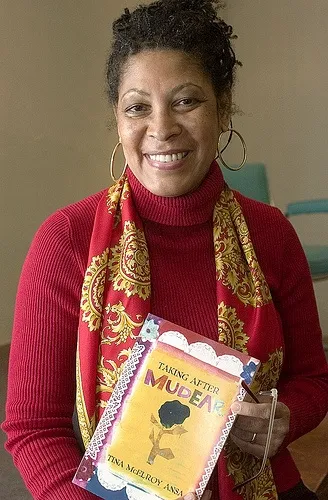 “Tina McElroy Ansa was the first Black woman to work at the Atlanta Journal and went on to write novels and essays, start a publishing house and podcast and organize seminars for writers,” reported the Atlanta Journal-Constitution.
“Tina McElroy Ansa was the first Black woman to work at the Atlanta Journal and went on to write novels and essays, start a publishing house and podcast and organize seminars for writers,” reported the Atlanta Journal-Constitution.
“Her first novel ‘Baby of the Family,’ was a New York Times Notable Book of the Year and was selected in 2002 for list of 25 Books Every Georgian Should Read.”
“Her unexpected death Sept. 10. at age 74 in her St. Simons Island home shocked friends and family,” Rebecca McCarthy reported Sept. 13 for the Atlanta Journal-Constitution.
In 1971,” she became the first Black woman to be hired at The Atlanta Constitution. Harmon Perry, who was hired in 1968, was the first Black reporter at The Atlanta Journal,” Adrianne Murchison wrote for the AJC on Feb. 7. “The papers were separate publications at the time before merging in 2001 to become The Atlanta Journal-Constitution.
“It was a time when newspapers were opening doors to Black people in efforts to have better access to communities of color.
“ ‘So much of the news was coming from the Black community,’ Ansa said. ‘Civil rights issues all over the country were in the news; Nixon’s impeachment, (Watergate whistleblower) Martha Mitchell. Everything was happening, and Americans were seeing politicians for the first time (under such scrutiny).’
“Ansa’s first experience working at The Atlanta Constitution, a morning newspaper, was on the copy desk where she worked with older veteran journalists who mentored her. It was an ideal launching pad where she could learn and grow.
“ ‘The copy desk was the perfect place for me,’ Ansa said. ‘I had the best time.’
“As the only black woman at the Atlanta Constitution, there were moments of feeling isolated from the rest of the staff.
“But, she learned that the managing editor of The Atlanta Constitution, Jim Minter, set a positive foundation before her first day of work. He ensured that Ansa would be supported with encouragement and guidance in her work in the busy, unfiltered newsroom, she said. . . .”
Short Takes
 LaSharah S. Bunting (pictured), a veteran journalist and CEO and executive director of the Online News Association, is joining The 19th as its first vice president, the news organization announced Sept. 5. Bunting is to “scale up The 19th’s fundraising capacity and lead our development, finance and budgeting operations, helping to sustain our critical independent journalism.”
LaSharah S. Bunting (pictured), a veteran journalist and CEO and executive director of the Online News Association, is joining The 19th as its first vice president, the news organization announced Sept. 5. Bunting is to “scale up The 19th’s fundraising capacity and lead our development, finance and budgeting operations, helping to sustain our critical independent journalism.”
- “Baltimore Sun management fired federal courts reporter Madeleine O’Neill on Monday, citing comments she made internally criticizing management’s approach to news coverage under its new owners,” Fern Shen reported Sept. 12 for the Baltimore Brew. “She did not have union protection to challenge her termination because she was still on her nine-month probation period. Sources said O’Neill was vocal on the newsroom’s internal Slack messaging channel about what she saw as declining journalistic standards since the newspaper was purchased by Sinclair Broadcast Group chairman David D. Smith.”
 “Gayle King (pictured) has signed a new deal with CBS News, extending her tenure at the network where she has co-hosted CBS Mornings, according to a source familiar with the matter,” Ted Johnson reported Thursday for Deadline. Last year, when TheGrio presented King with an award, she said that at 68,, “I’m not even thinking about retirement” and is “looking for more things to do.” This, when Walter Cronkite, the legendary “CBS Evening News” anchor, was made to retire at 65.
“Gayle King (pictured) has signed a new deal with CBS News, extending her tenure at the network where she has co-hosted CBS Mornings, according to a source familiar with the matter,” Ted Johnson reported Thursday for Deadline. Last year, when TheGrio presented King with an award, she said that at 68,, “I’m not even thinking about retirement” and is “looking for more things to do.” This, when Walter Cronkite, the legendary “CBS Evening News” anchor, was made to retire at 65.
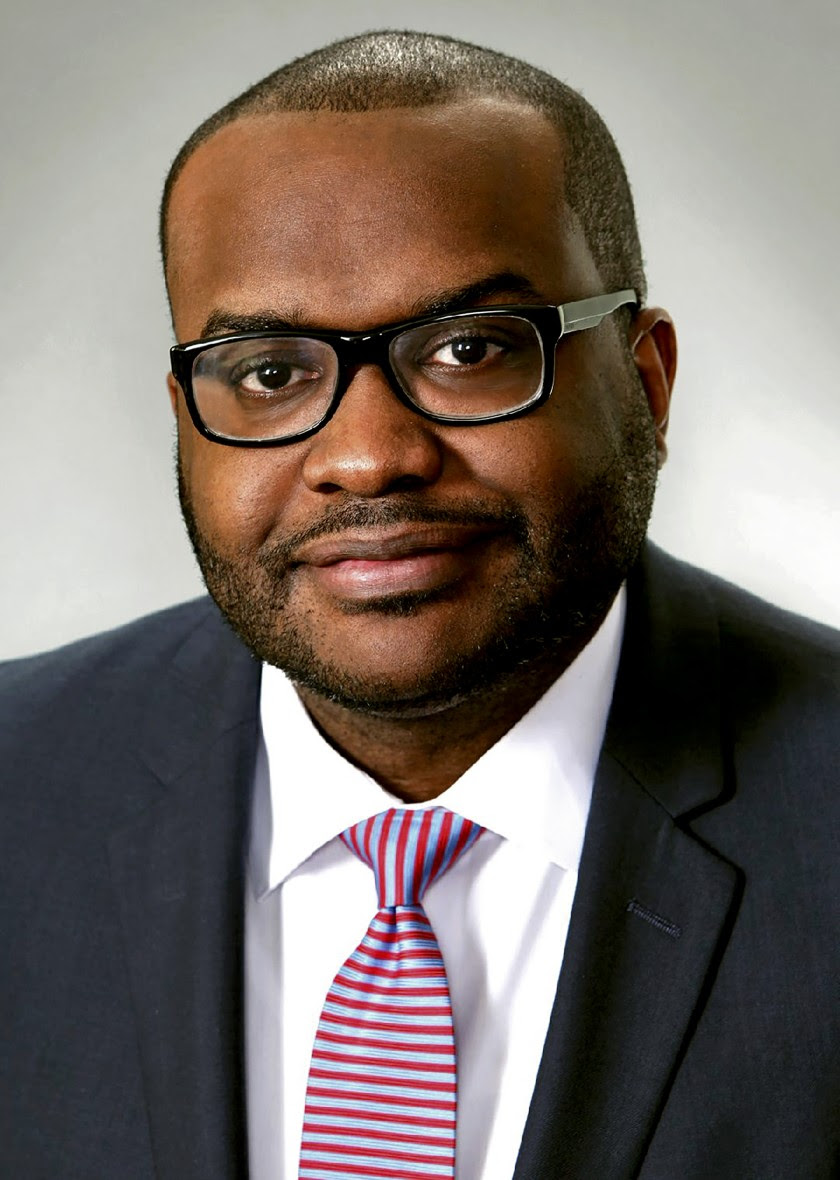 “Johnny Green Jr. (pictured), the general manager of WCBS-TV in New York, will take on a new role of general manager and president of New York and CBS Boston’s WBZ-TV (Channel 4), CBS told WBZ employees on Friday,” Aidan Ryan reported Sept. 16 for the Boston Globe.
“Johnny Green Jr. (pictured), the general manager of WCBS-TV in New York, will take on a new role of general manager and president of New York and CBS Boston’s WBZ-TV (Channel 4), CBS told WBZ employees on Friday,” Aidan Ryan reported Sept. 16 for the Boston Globe.
- “Slavery’s Descendants,” “revealing for the first time the familial connections between long-ago slaveholders and today’s political elite,” by Reuters; “The Killing of Richard Oakes,” a Mohawk activist, by the San Francisco Chronicle, and “How AI reduces the world to stereotypes” from Rest of World, won Online News Association awards in the “Topical Reporting: Race, Ethnicity, Gender and Identity” category. The awards were announced during a virtual event in mid-August and during the Online Journalism Awards banquet Friday in Atlanta.
- “The Affordable Connectivity Program (ACP), a federally funded program providing discounted internet service to economically disadvantaged households, officially ended on June 1, 2024, due to lack of funding from Congress,” Leah Mallory reported Thursday for the New York Amsterdam News. “With no more federal financial support, millions of households are left to reap the consequences.”
- “The St. Louis NAACP is asking the federal government to help mitigate the ‘literacy crisis’ Black students are facing in the classroom,” Gabrielle Hays reported Wednesday for the “PBS News Hour.” “The organization filed a federal civil rights complaint against 34 public school districts and charter networks earlier this month over the low literacy rates in Missouri schools. The complaint, aimed at schools in St. Louis city and county, follows years of troubling data showing stark disparities between Black and white students’ reading scores.”
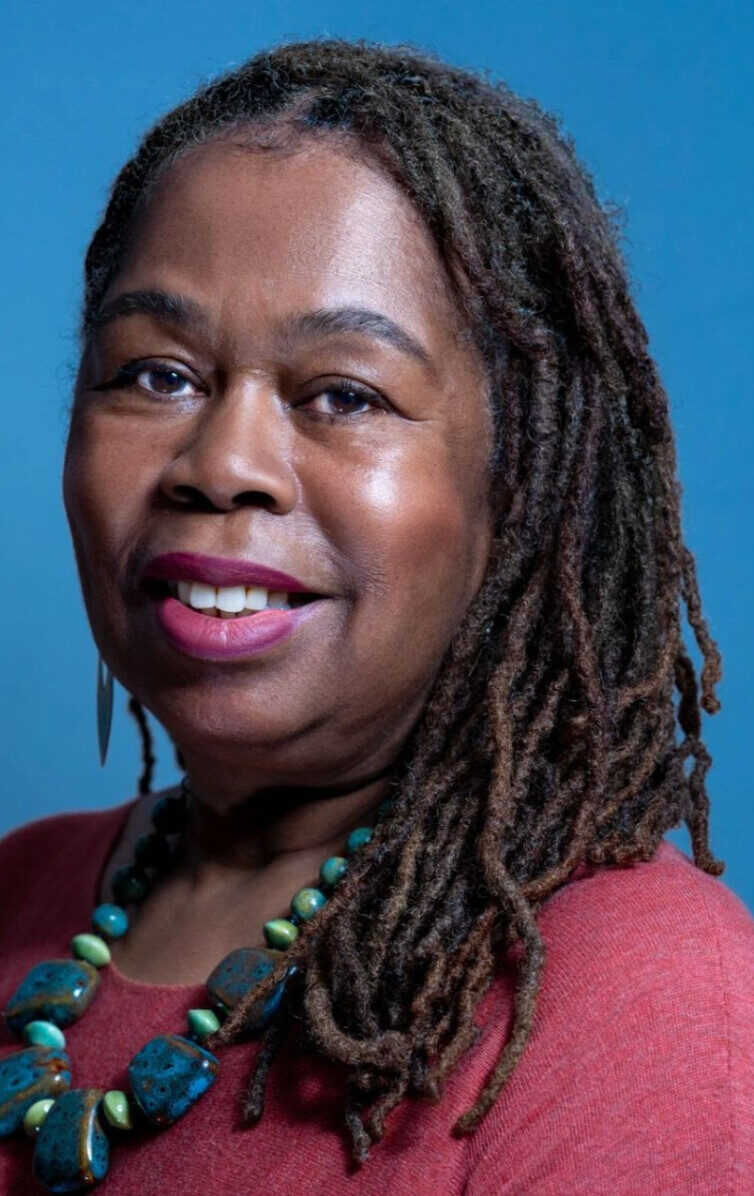 “Susan Smith Richardson (pictured), former managing editor of Guardian US and CEO of the Center for Public Integrity, has joined The Pivot Fund as managing director, as the fund expands to support hyperlocal news outlets serving communities of color nationwide,” the fund announced Sept. 16.
“Susan Smith Richardson (pictured), former managing editor of Guardian US and CEO of the Center for Public Integrity, has joined The Pivot Fund as managing director, as the fund expands to support hyperlocal news outlets serving communities of color nationwide,” the fund announced Sept. 16.
- The Indigenous Journalists Association Board of Directors is hosting three drop-in “office hours” sessions this fall. These office hours will be held over Zoom and are open to all IJA members, the organization announced. The remaining sessions are Oct. 17 and Nov. 21. In addition, “Recordings from many of the 2024 Indigenous Media Conference sessions are now available on the IJA hub. Access is provided free to all IJA Members and all registered conference attendees,” IJA said.
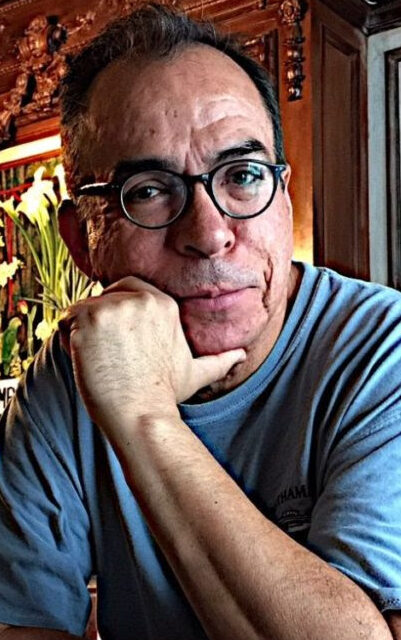 “In February, seasoned immigration and border reporter Alfredo Corchado (pictured) took on a new challenge: covering his home,” Hanaa’ Tameez reported Sept. 16 for Nieman Lab. “Corchado, a native of El Paso, Texas, is now the executive editor of the Puente News Collaborative, a bilingual nonprofit journalism initiative funded by the El Paso Community Foundation to report (and fund reporting) on both sides of the 1,954-mile border that separates Mexico and the United States.” At least 30 counties on either side of the border don’t have any active news sources, according to some preliminary research by Puente.
“In February, seasoned immigration and border reporter Alfredo Corchado (pictured) took on a new challenge: covering his home,” Hanaa’ Tameez reported Sept. 16 for Nieman Lab. “Corchado, a native of El Paso, Texas, is now the executive editor of the Puente News Collaborative, a bilingual nonprofit journalism initiative funded by the El Paso Community Foundation to report (and fund reporting) on both sides of the 1,954-mile border that separates Mexico and the United States.” At least 30 counties on either side of the border don’t have any active news sources, according to some preliminary research by Puente.
- “A group of well-known media leaders and philanthropists have teamed with the American Journalism Project (AJP) to raise $15 million for a new, Los Angeles-based local news initiative,” Sara Fischer reported Sept. 10 for Axios. “The local news ecosystem in LA, the second-largest city by population in the U.S., has been decimated in recent years by layoffs and cutbacks related to business challenges.”

AI newsreaders La Chama and El Pana have been providing daily updates on the Venezuelan president’s post-election crackdown. (Credit: Connectas)
- In the weeks since Venezuela’s disputed July 28 election, local journalists have come up with a distinctly 21st-century tactic to avoid being arrested for reporting on 21st-century socialism: using artificial intelligence avatars to report all the news Maduro’s regime deems unfit to print, Tom Phillips and Patricia Torres reported Aug. 27 for the Guardian. “In daily broadcasts, the AI-created newsreaders have been telling the world about the president’s post-election crackdown on opponents, activists and the media, without putting the reporters behind the stories at risk. . . .”
To subscribe at no cost, please send an email to journal-isms+subscribe@groups.io and say who you are.
Facebook users: “Like” “Richard Prince’s Journal-isms” on Facebook.
Follow Richard Prince on Twitter @princeeditor
Richard Prince’s Journal-isms originates from Washington. It began in print before most of us knew what the internet was, and it would like to be referred to as a “column.” Any views expressed in the column are those of the person or organization quoted and not those of any other entity. Send tips, comments and concerns to Richard Prince at journal-isms+owner@
View previous columns (after Feb. 13, 2016).
View previous columns (before Feb. 13, 2016)
- Diversity’s Greatest Hits, 2018 (Jan. 4, 2019)
- Book Notes: Is Taking a Knee Really All That? (Dec. 20, 2018)
- Book Notes: Challenging ’45’ and Proudly Telling the Story (Dec. 18, 2018)
- Book Notes: Get Down With the Legends! (Dec. 11, 2018)
- Journalist Richard Prince w/Joe Madison (Sirius XM, April 18, 2018) (podcast)
- Richard Prince (journalist) (Wikipedia entry)
- February 2018 Podcast: Richard “Dick” Prince on the need for newsroom diversity (Gabriel Greschler, Student Press Law Center, Feb. 26, 2018)
- An advocate for diversity in the media is still pressing for representation, (Courtland Milloy, Washington Post, Nov. 28, 2017)
- Morgan Global Journalism Review: Journal-isms Journeys On (Aug. 31, 2017)
- Journal-isms’ Richard Prince Wants Your Ideas (FishbowlDC, Feb. 26, 2016)
-
Richard Prince with Charlayne Hunter-Gault, “PBS NewsHour,” “What stagnant diversity means for America’s newsrooms” (Dec. 15, 2015)
- Book Notes: Journalists Follow Their Passions
- Book Notes: Journalists Who Rocked Their World
- Book Notes: Hands Up! Read This!
- Book Notes: New Cosby Bio Looks Like a Best-Seller
- Journo-diversity advocate turns attention to Ezra Klein project (Erik Wemple, Washington Post, March 5, 2014)

